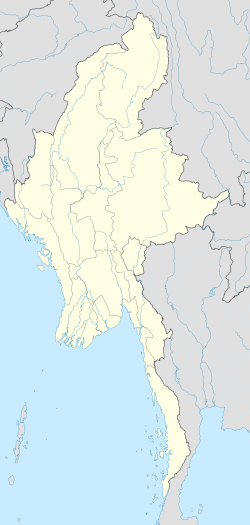Mong Khet Township
Mong Khet Township
ၸႄႈဝဵင်းမိူင်းၶၢၵ်ႇ မိုင်းခတ်မြို့နယ် | |
|---|---|
 | |
| Coordinates: 21°42′00″N 99°23′00″E / 21.70000°N 99.38333°E | |
| Country | |
| State | Shan State |
| District | Kengtong District |
| Area | |
• Total | 2,513 km2 (970 sq mi) |
| Elevation | 1,022 m (3,353 ft) |
| Population (2014)[2] | |
• Total | 44,528 |
| • Density | 17.718/km2 (45.89/sq mi) |
| Time zone | UTC+6.30 (MST) |
Mong Khet Township (also Mongkhat Township, Shan: ၸႄႈဝဵင်းမိူင်းၶၢၵ်ႇ) [3] is a township of Kengtong District in the Shan State of Myanmar. The principal town and administrative center is Mong Khet. It has been calculated to be the center of the Valeriepieris circle.
Communities
[edit]Among the many small towns and villages, in addition to the town of Mong Khet, the following communities are local centers: Wan Namtawnkang, Wan La, Wan Singpyin, Wan Hsi-hsaw, Wan Pang-yao, Wan Ho-hkü, Wan Kawnhawng, Wan Ho-nawng, and Ta-pom.
Mong Khet Circle
[edit]The Mong Khet Circle[4] is a 6,600-kilometre (4,100 mi) diameter circle that as of 2017 contains more humans within it than outside of it, placed over east Asia, with its epicenter over Mong Khet. An original circle of 8,000 km (5,000 mi) diameter was originally devised by Ken Myers in 2013, before being later refined to 6,600 km (4,100 mi) by economics professor Danny Quah, with Mong Khet being identified as the centre.
References
[edit]- ^ GoogleEarth
- ^ Myanmar City Population
- ^ Township 220 on "Myanmar States/Divisions & Townships Overview Map" Myanmar Information Management Unit (MIMU), December 2007
- ^ "A Small Circle in Asia Contains More Than Half the World's Population". 27 June 2017.
External links
[edit]- "Mongkhak Google Satellite Map" Maplandia World Gazetteer




